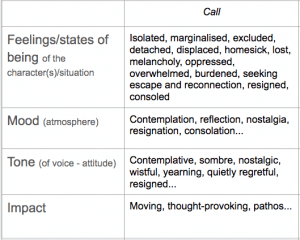In this short story, Carver offers several perspectives of love and therefore enables his readers to form interpretations based upon the discussion between the four characters presented in the story. Carver chooses to set the scene of the story with simplicity, which is used in order to allow readers to focus on what is being said and not use the setting and the character’s descriptions to form their interpretations. Instead, the author utilises these characters as a pathway to introduce several points of view, that both interlink as well contradict each other and offer challenging questions.
Carver’s tone in this story varies between characters. As Mel holds most of the dialogue, Carver is able to present Mel with the most distinct voice and the one that dominates the scene. Thus enabling the readers to easily note Mel’s actions and words, and thus perhaps finding themselves agreeing with this character’s rather contradictory perspective on love.
Mel is presented as a character who both appears disorderly and pessimistic, as shown by his relationship with Terri, but also perceives Mel to be a character with admiration and optimism, through his attitude towards the elderly couple who appeared to have a fairytale-like relationship. Perhaps this is why Mel progressively becomes more aggressive during this scene, as he realises that his relationship with Terri, which appears to be realistic, is not what he desires and therefore he challenges Terri and offers controversial ideas to the group. Carver indicates that Mel is possibly ashamed of his love with Terri and hence makes conscious decisions to ruin it and create tension, in which no other character responds significantly to. It is this silence, that Carver creates, which produces this idea that love is a mystery, and leaves the question of what is love and what it might look like unanswered.
Carver uses this piece as a form of providing perspectives rather than showing his own through each of the characters. Its this choice that makes the story more complex and allows questions and challenges to arise.



